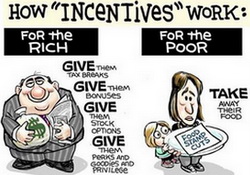
The War on the Poor continues, and Kansas legislators have struck a killing blow by placing a daily cap of $25 on cash withdrawals for individuals who receive public assistance benefits. The Republican majority hates small intrusive government for everyone but the poor…And women. Oh, and same sex couples receive a great deal of government intrusion too. But – it is for their own good!
Legislators justified the move, saying they ‘wanted to ENSURE beneficiaries weren’t wasting the money available to them.” Ironically, beneficiaries will now be wasting much more money – but it will be going to ‘good’ places, like banks who will benefit from ATM charges, and crooked payday loan companies also have reason to cheer.
The repercussions are wide. Families without enough money to maintain a minimum balance in a conventional checking account will pay rent and utility bills in cash. A single mother with two children seeking to withdraw just $200 in cash could incur $30 or more in fees, which is a big chunk of the roughly $400 such a family would receive under the program in Kansas.
“The complexity of functioning in that cash economy as a very poor family is just not a reality that most of us experience day to day,” said Shannon Cotsoradis, the president of Kansas Action for Children in Topeka. “I pay my bills online.”
Since most banking machines are stocked only with $20 bills, the $25 limit is effectively a $20 limit. A family seeking to withdraw even $200 in cash would have to visit an ATM 10 times a month, a real burden for a parent who might not have a car and might not live in a neighborhood where ATMs are easy to find.
In other small government news: Legislators in Wisconsin approved a bill Wednesday that would require drug tests for some Wisconsin residents seeking food stamps or unemployment. The plan would require applicants for state job training programs including Wisconsin Works to answer questionnaires screening for drug abuse. Based on the answers, applicants could be forced to undergo drug tests and enter state-sponsored treatment to remain eligible for aid.